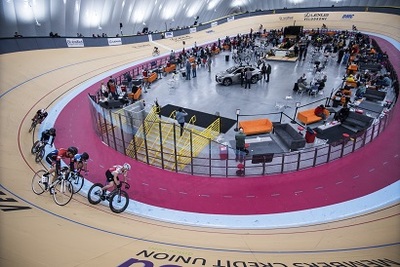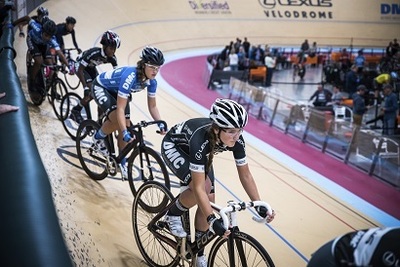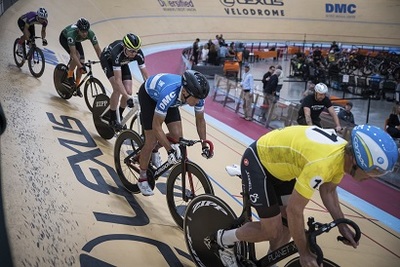Lexus Velodrome Draws Brand Equity and Cyclists
 |
By Maureen McDonald
Senior Editor
Michigan Bureau
The Auto Channel
Between 300 and 500 people arrive one Saturday a month to watch some of the finest bike racers in the country cycle round and round the Lexus Velodrome in Midtown Detroit In between an average of 200 to 300 people come for the Saturday night rumbles. In nine months of activity, a Lexus spokesperson is ready to say their brand sponsorship was a spinning success.
“Lexus dealers jumped at the possibilities that their brand would have naming rights to the Velodrome,” says Curt McAllister, spokesperson for Lexus. The 64,000 square-foot, domed stadium is one of only a handful of indoor bike racing facilities in the country. The only covered facility in the Midwest. Dealers often bring customers, friends and family to cheer the expert riders on a steeply banked, oval track.
 |
While the price of naming rights wasn’t disclosed, Lexus also invested 22,000 this year to run a youth cycling camp for 240 youths at the velodrome. Built in late 2017, the facility at the Chrysler Freeway and Mack Avenue in a rapidly gentrifying sector of Detroit becomes a beacon for physical fitness.
McAllister said additional Lexus funds could be available for bike scholarships, global competitions and other events. For a modern car company, two wheeled sports have a prominent place in the social commitment and marketing strategy. “Our goal is to promote physical fitness, a major priority of Toyota. The car company tried funding a cigar lounge at Comerica Park where the Detroit Tigers play but it didn’t gain traction for the brand.
Having their name affixed to the side of the building and the surface of the oval track has visibility. Races are broadcast on the Public Broadcasting System (PBS) generating 2,000 to 5,000 viewers beyond the attendees.
 |
Cycling is a big sport with millennials, a prized market for all car makers. McAllister said several dealers across America sponsor cycling teams and Lexus supports bike tours on the east and west coast. A weekly ride called Slow Roll attracts 3,000 to 4,000 riders in Detroit and similar programs have started in surrounding suburbs and other big cities. The Detroit Free Press noted an anonymous donor gave $5 million to Dale Hughes, director of the Detroit Fitness Foundation that built and organizes activities at the velodrome.
If velodrome seems a strange name, pedal the way back a century or more. Cycling was more convenient and agile than horses in big cities in the late 1800s. Bike races captivates America with indoor race tracks dotting the east coast. The first Olympia Stadium, built in 1927, was designed to host both cycling races and hockey games.
“The sport was so huge in the early 20s that baseball star Babe Ruth would go to bike races and ask for signatures of the winning cyclist,” Hughes notes. As the cars became more popular, the bike craze winnowed down. Then Lance Armstrong won the Tour de France and followers sought to emulate the fitness possibilities with a bike. Many towns put in bike lanes and greenways. People cycle from childhood to advanced seniors.
“Nearly every car company is involved in bike expression,” Hughes notes. Numerous cars on display at the North American Auto Show featured bikes perched on racks atop the roof. In fact, Lexus invited journalists to a media event at the Lexus Velodrome during the auto show.
McAllister noted that bikes and cars aren’t separate entities. People use cars to transport their bikes to the velodrome, the bike paths and shopping trips. With a growing number of transportation options, whether renting a car, hailing an Uber or purchasing, a bike is a compatible adjunct to the ever-reliable four-wheeled luxury vehicles.
“We’re happy that students in the summer camp re-introduced their parents to cycling. More people are finding fitness worthwhile,” says McAllister. “This is a great opportunity for Lexus to give back to the community.”


